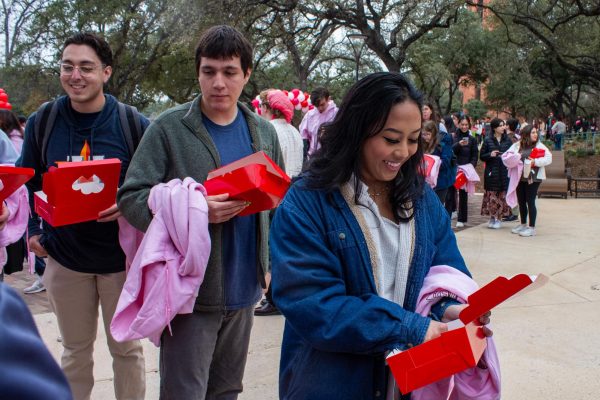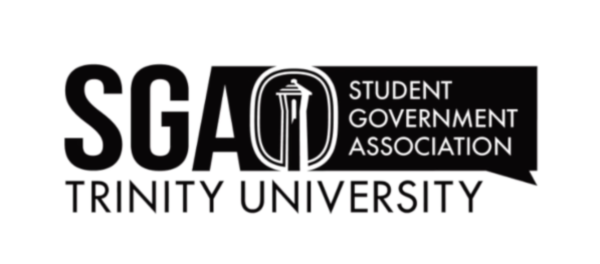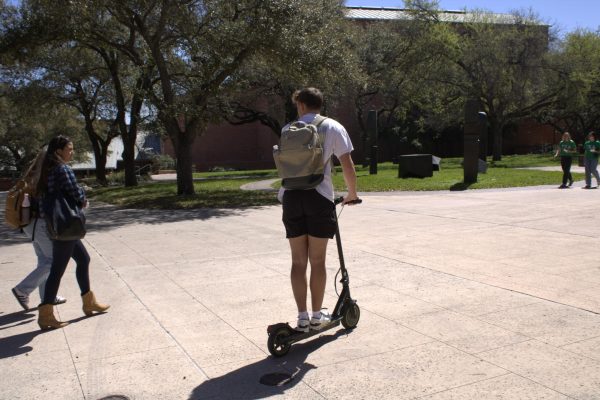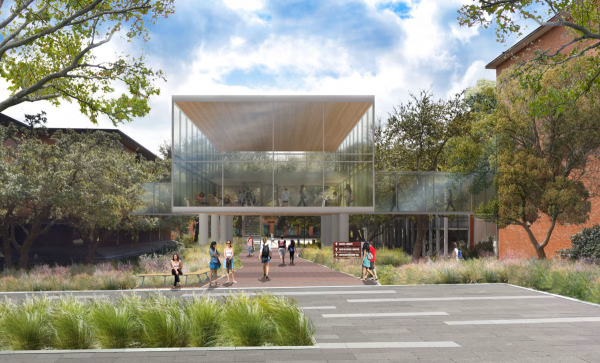Trinity trades out Aramark for Chartwells
Trinity moves toward more ethical dining while protecting the jobs of frontline employees
Trinity announced on Feb. 13 that it will be switching dining service partners to Chartwells after 50 years with Aramark. Sheryl Tynes stated in an email to students that Chartwells “truly reflect[s] Trinity’s unique campus culture and values,” and assured that the frontline staff of Trinity’s current dining services will all be offered positions with Chartwells.
This decision was made last semester by a committee of staff, faculty and students who evaluated six dining candidates. But, the push for a new dining service provider began in 2020, in the wake of the George Floyd protests, with the creation of Tigers Against Aramark, now renamed Tigers for Ethical Dining (TFED).
TFED was created to bring awareness to the unethical practices on Aramark’s corporate level, primarily Aramark’s role in providing dining services to prisons in the United States. Brandon Niday, recent political science and economics graduate and a student from TFED on the Request for Proposal (RFP) committee, described the extent to which Aramark was involved.
“They [Aramark] own 38% of the share of prison food operations in the United States, which means that they’re profiting off of mass incarceration, really,” Niday said.
Niday and Anirudan Sivaprakash (Ani Siva), sophomore biochemistry and molecular biology double major, were able to secure seats on the RFP committee. Diana Heeren, associate vice president of finance and co-chair of the dining services RFP committee, said she believes Chartwells better represents Trinity.
“This committee evaluated [six] suppliers based on 16 criteria. … [We looked at] quality of residential dining at Mabee [Dining] Hall, company values and company resources, social and environmental justice, the company’s focus on nutrition and wellness, opportunities for student employment and internships, as well as the proposed retail venues for campus,” Heeren said. “[Chartwells has] a focus on sustainability and social justice that really stood out to the committee.”
Chartwells’ goals of implementing more sustainable practices and buying more locally owned products solidifies the progression of Trinity’s values, too.
“Chartwells has committed to source 20% or more of products annually from local sources within 250 miles of campus,” Heeren said.
Niday and Siva strove to ensure that despite their positions against Aramark, the frontline workers in Mabee Dining Hall, the P.O.D., Starbucks and Coates Student Center would be protected. Niday discussed this effort during their semester-long decision process.
“We really love our frontline staff. I know our students really bond and connect with them, and I know we would never want them to get hurt in the transition process. They’re our number one priority because we have to protect them,” Niday said. “The transition is about making the program better, but our employees are already at their best. We want them to stay with us.”
Niday and Siva sought out partners that would benefit our frontline workers. Siva assures students that not only are their jobs protected, but the frontline dining staff will have better perks with Chartwells.
“Employee compensation was a very, very, very big part of this entire endeavor,” Siva said. “Chartwells is offering employment at a much higher compensation than what Aramark was offering them. Additionally, there are more sick days, vacation days [and] more benefits as well.”
The efforts to protect the frontline employees continue past the decision process. Trinity is working to ensure that Chartwells helps accommodate frontline dining workers during the upcoming transition.
“We’re trying to really support them … in the negotiations with the suppliers. Chartwells has also expressed willingness about that,” Niday said. “We’ll do our very, very best to protect current employees and hire more … full-time positions.”
However, their positions are not guaranteed by Chartwells, and Heeren outlined what the transition process will look like for the dining staff.
“If they are interested, Chartwells is encouraging them to apply for a position – possibly their same position,” Heeren said. “I don’t want to say [they’re] guaranteed [a position] because there’s always something they may not like about the offer, but Chartwells is encouraging them to apply and would love to retain all of those staff. I mean, they’re really what make Trinity dining special.”
While Trinity works to help frontline staff at all dining locations on campus maintain their positions, some of the venues, like Revolve, may undergo changes.
“While we have not finalized the venues, we believe Starbucks will continue to operate as it has in the past,” Heeren said. “Revolve will likely change. We know the concept of rotating vendors is very popular, so some version of Revolve, with a new name, will be included as part of the retail mix in Coates Student Center.”
Although there will be changes, students won’t see them by the end of this semester. Heeren described the unfolding process of the transition.
“In late May, after commencement and the spring board of trustees meetings, Aramark will begin to close down the venues and move out to allow time for the Chartwells team to move in so they are ready on June 1,” Heeren said.
This change displays the work of students at Trinity, too. Siva and Niday’s push for more ethical dining and protection of frontline staff reminds students of their influence, as Siva mentions.
“It goes to show that students can change things that they see on campus that they don’t agree with,” Siva said. “It starts with just one voice.”

Hi! My name is Samara Gerstle (she/her), and I’m the managing editor of the Trinitonian. I’m a junior English major with minors in creative writing...

Whattup! My name is Skylar Savarin (she/her/hers), and I am the Visual section editor! I am a third-year double majoring in Human Communication and Art....










